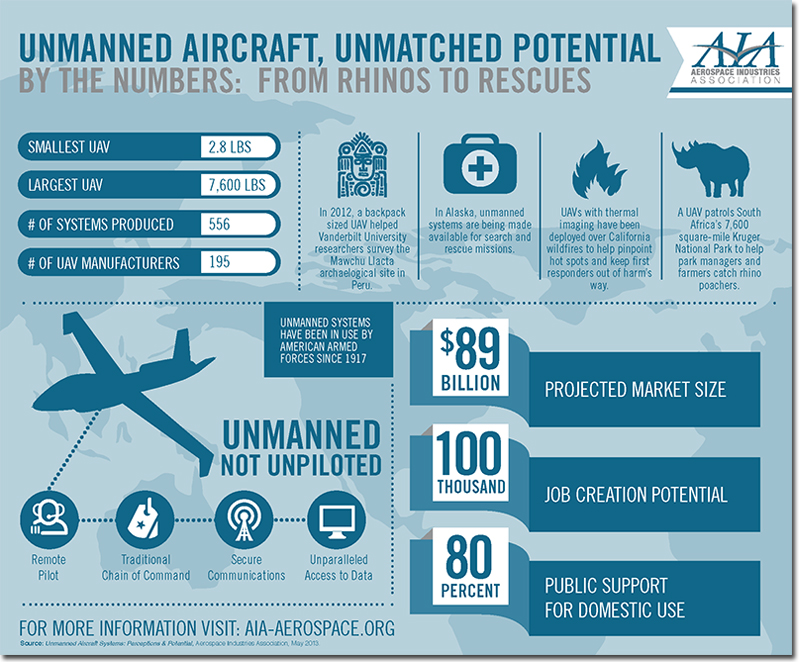The Senate Commerce, Science and Transportation Committee will hold a hearing next year on the commercial use of drones, including Amazon’s plan to use drones to deliver products.
“Amazon’s plans for using drones to deliver packages is just one example of the potential this technology offers consumers, and a reflection of the ingenuity of American business,” Committee Chairman Jay Rockefeller (D-W.Va.) said in a recent statement.
“As we move forward toward integrating drones into civilian life and capitalizing on the economic opportunities they offer, we must make certain that these aircraft meet rigorous safety and privacy standards. I plan to hold a hearing early next year to explore the potential economic benefits of unmanned vehicles in our airspace as well as the potential risks they may create.”
A Commerce Committee aide said the hearing was already in the works before Amazon’s announcement on Sunday.
Both the House and Senate Judiciary Committees held hearings this year on the use of drones in domestic airspace. Those hearings focused mostly on the use of drones by police and other government agencies for surveillance.
Federal rules currently ban the commercial use of drones. But the Federal Aviation Administration is working on rules to allow private groups to fly drones in U.S. airspace as early as 2015.
Amazon CEO Jeff Bezos announced his company’s plan to eventually use drones to deliver packages on an episode of “60 Minutes” that aired Sunday.
“I know this looks like science fiction. It’s not,” he said.
Bezos said the concept is still “years away.” But he envisions half-hour deliveries of objects up to five pounds, “which covers 86 percent of the items that we deliver.”
“These generations of vehicles, it could be a 10-mile radius from a fulfillment center,” Bezos said. “So, in urban areas, you could actually cover very significant portions of the population. And so, it won’t work for everything; you know, we’re not gonna deliver kayaks or table saws this way. These are electric motors, so this is all electric; it’s very green, it’s better than driving trucks around.”
FAA chief: Drones ‘inherently different’
Federal Aviation Administration (FAA) chief Michael Huerta said on Thursday that drones were “inherently different” to fly than commercial airplanes.
Speaking to the Aerospace Industries Association (AIA), Huerta said the FAA’s consideration of increasing the use of non-military drones was not as simple as clearing them to fly in the same way the agency approves airplanes.
“There are operational issues that we need to address, such as pilot training,” Huerta continued. “We also need to make sure that unmanned aircraft sense and avoid other aircraft, and that they operate safely if they lose the link to their pilot. This is why developing more test data is so important.”
Huerta said that the FAA was planning to select six sites to test the operation of drones alongside commercial flights by the end of the year.
He touted a “roadmap” for the drone study that was released by the agency on Thursday requiring any potential test sites to have a plan to protect the privacy of nearby citizens.
“This policy requires operators to comply with all local, state and federal laws concerning privacy and civil liberties,” Huerta said. “We’re requiring the test site operators to create a privacy policy that is available to the public. And they must require anyone operating unmanned aircraft at the test sites to have a written plan for how they will use and retain any test data acquired.”
The FAA chief added that other federal agencies were also working to make sure that increased drone use does not infringe on anyone’s privacy.
“On a broader level, agencies across the government are coming together to work on privacy issues that may arise with the increasing use of unmanned aircraft beyond these test sites,” Huerta said.
He also warned the aerospace industry that the FAA’s regulations of non-military drones would change regularly.
“Our airspace system is not static,” Huerta said. “And it’s important for industry to understand that unmanned operations will evolve over time.”
Source: The Hill
Related: Amazon Testing Drones Because Otherwise Drones Could Kill Amazon (Delivery)
Article topics
Email Sign Up
















